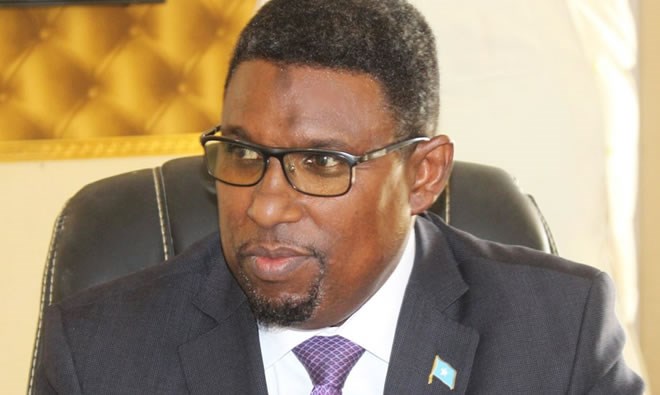
Somalia’s minister of petroleum & mineral resources Abdirashid Mohamed Ahmed
The geology of offshore Somalia is proven— and fresh details attracted even more attention at Africa Oil Week in November—as the country prepares for its much-delayed first licensing round in December.
An independent assessment of the 15 blocks has found there may be 30bn bl of oil in shallow and deepwater, which is easily accessible so long as it remains free of the piracy that afflicted the area in recent memory.
Since the merger of subsurface data providers Spectrum and TGS this year, the Somali offshore has been supported by “a much bigger data library”, according to the first scientist to evaluate it, Karyna Rodriguez, vice president of geosciences at TGS.
“We really see oil potential all along the Somali coast. This is going to be the next oil province. I totally agree with the ministry. This is not going to be gas… the source rocks are not buried deep enough to be giving off gas.”
Above-ground risk
She says TGS’s “thermal maturity modelling indicates that we will be generating a lot of oil, the [sea surface] slick evidence is telling us that we are generating light oil and we have a lot of different structures. This is a huge area… and each of these leads is big. In terms of the subsurface, we have huge potential. We have done a summation of all the potential leads and it comes to about 30 bn bl. And that is just what we were able to map out,” says Rodriguez.
However, it will be above-ground risks—in a country plagued by civil war since the 1980s, followed by piracy and terrorism—at the forefront of decision- makers’ minds at international oil companies (IOCs) when they are deciding whether to become involved.
There is no doubt that the worst is behind Somalia, with piracy under control for the better part of a decade. Actual and attempted attacks by Somali pirates peaked at 237 incidents in 2011, according to trade association the ICC International Maritime Bureau, but this fell steeply to just a handful of incidents, if any, each of the last six years.
The bureau reported that Somalia experienced no piracy-related incidents for the first nine months of 2019 but the threat remains. “Although no incidents have been reported, Somali pirates continue to possess the capacity to carry out attacks in the Somali basin and wider Indian Ocean. As a result, the IMB PRC advises ship owners to remain cautious when transiting these waters,” it stated in an October report.
The United Nations notes just two incidents since October 2018, a failed attempt to board a bulk carrier east of Mogadishu in which defensive shots were fired, and a single one this year in April involving two fishing boats off the central coast. TGS reports that no security incidents took place while carrying out its seismic testing.
On 4 December the UN renewed Resolution 2500, effective until December 2020, which allows states and regional organisations to enter into Somali territorial waters and use all necessary means to repress acts of piracy and armed robbery at sea.
Political stability
On land, the government is fighting Al-Qaeda aligned Al-Shabaab, which the UN describes as still being a “potent
The intertwined political and security situations in Somalia are currently stable and democratic institutions are being constructed under the guidance of the United Nations. The first universal election since 1969 is planned for 2020.
Somalia’s Prime Minister, Hassan Ali Khayre, committed publicly at the Somalia Partnership Forum, in the presence of the UN special representative, in October that it will prioritise “holding open and fair elections and ensuring a peaceful transition, completion of the constitutional review process and deepening of federalism, all this while not losing sight of the gains made so far and the investment of our international partners”.
Central to ensuring that the sudden emergence of oil money does not become a destabilising force is a production sharing arrangement agreed between the central government and its six constituent member states. The member states will receive up to 70pc of the revenue. It effectively passed a trial run in June; $1.7mn fees relating to agreements struck prior the civil war were dispersed without issue.
The country is in desperate need of revenue. This year the cereal harvest was the worst since 2011 and Food and Agriculture Organisation predicts that it will lead to “severe hunger” for 2mn people. In November, this was compounded by flooding that caused at least 19 deaths. The conditions offshore can also be challenging; tropical cyclone Pawan was making its way across the Indian Ocean to the Somali offshore as this publication was going to press.
Somalia’s minister of petroleum & mineral resources Abdirashid Mohamed Ahmed spoke to Petroleum Economist about his hopes for the licensing round and what his government is doing to ensure that it will be a success.
Somalia, unfortunately, is perhaps best known for its long civil war and piracy. Does a threat remain for oil companies considering bidding in the licensing round?
Ahmed: Somalia was well known before for insecurity, piracy and terrorism. But now things have changed. The goal of the federal government of Somalia is to eradicate all piracy and Al-Shabaab. For piracy, there has not been a single incident [involving casualties] in Somalia for 10 years. Thanks to African troops and American forces fighting together with Somali forces, piracy is not there and the offshore is safe.
How confident can you be that the production sharing agreement with the member states will hold if oil money starts flowing?
Ahmed: We took up the federal system [in 2012]. In order that we [honour] the constitution, the Somali federal government negotiated a resource sharing and management agreement with the federal member states. We reached agreement on 5 June. That agreement was signed by the prime minister of the federal government and signed by all the presidents of the member states, so it is now part of the constitution.
The civil war destroyed most of the country’s infrastructure, some of which would be needed for the development of the oil sector. How will this be reconstructed?
Ahmed: Somalia was engaged in civil war for a long time and all infrastructure collapsed. The oil revenue will be invested in all that is missing—infrastructure, environment, bridges, education, health and social services. The central government of Somalia will pay [with the money] it will generate from oil operations.
The federal states will present their plans for what they would do with their share of the money. The government would then approve it and give them that investment. The federal government has the final say. The federal states’ [priorities are the] same, but infrastructure will be the first.
How is Somalia approaching the licensing round?
Ahmed: We are hoping to, first of all, present and showcase our data. Then follows the bid round—companies will show their interest in bidding for the blocks and then selection will come. We welcome IOCs to show their interest in Somalia—who is favoured by Somalia [will be done] in a transparent way. That is the way that we are proceeding. The central government of Somalia is responsible. We will work closely with the states—they will have their own contribution, but the federal government will lead the process.
Exciting discoveries can quickly become bogged down in bureaucracy or disputes. What is Somalia doing to ensure this will not happen?
Ahmed: There have been lessons learned by Somalia. Somalia is the last frontier country willing to start oil operations so we will learn from all our neighbouring countries.
In addition, we have prepared all necessary [steps] such as legislation and sharing agreements with the federal member states, and the contract itself is ready. Nothing will be delayed. When we start dealing with the companies, we will facilitate all of what is necessary.
What plans has the government put in place for the oil once it starts flowing?
Ahmed: The plan will come after we negotiate with the companies. The domestic market will be first but we want to sell oil to the [international] market. We used to have a refinery in Somalia but it collapsed during the civil war. And we are planning to build new refineries that will facilitate the domestic market. The other portion we would export as crude.
Beyond the upcoming licensing round, what other opportunities are there in Somalia?
Ahmed: What we have [offered] now is not the total Somali offshore, only a portion of Somalia’s offshore. We are planning to complete a full seismic survey of the Somali offshore, which will take place in less than one year. Potentially, more licensing rounds [will follow] depending on what happens with the seismic.
What message do you want to get out to IOCs?
Ahmed: The message is that Somalia is ready for business. All the necessary steps have been taken—the legislation is ready and the Somali offshore is safe. We are inviting all IOCs to look into Somalia. The market is huge, much bigger than they are expecting. And, getting to the international market is easy. Somalia is in a very good strategic location in East Africa, the Horn of Africa, adjacent to the Indian Ocean and the Gulf of Aden. Investment in Somalia is very easy, and connections to other markets are very easy as well.
https://hiiraan.com/news4/2019/Dec/166465/somalia_s_oil_may_secure_the_peace.aspx

